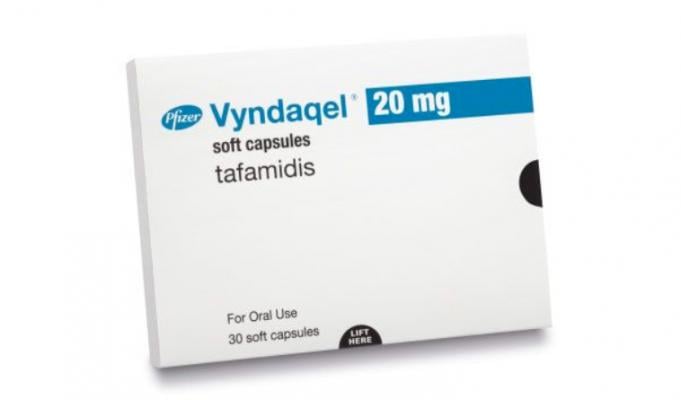
Tafamidis meglumine (Vyndaqel) is one of two new drugs cleared by the FDA for the treatment of the cardiomyopathy caused by transthyretin mediated amyloidosis (ATTR-CM) in adults. These are the first FDA-approved treatments for ATTR-CM.
May 6, 2019 — The U.S. Food and Drug Administration (FDA) approved tafamidis meglumine (Vyndaqel) and tafamidis (Vyndamax) capsules for the treatment of the cardiomyopathy caused by transthyretin mediated amyloidosis (ATTR-CM) in adults. These are the first FDA-approved treatments for ATTR-CM.
The drugs are two oral formulations of the first-in-class transthyretin stabilizer tafamidis. Vyndaqel and Vyndamax have the same active moiety, tafamidis, but they are not substitutable on a milligram to milligram basis and their recommended doses differ.
“Transthyretin-mediated amyloidosis is a rare, debilitating and often fatal disease,” said Norman Stockbridge, M.D., Ph.D., director of the Division of Cardiovascular and Renal Drugs in the FDA’s Center for Drug Evaluation and Research. “The treatments we’re approving today are an important advancement in the treatment of the cardiomyopathy caused by transthyretin-mediated amyloidosis.”
Reuters reported Pfizer believes this drug may be a block buster and that the company set a list price of $225,000 a year for the medication. Analysts are forecasting annual sales to exceed $1 billion in 2024, according to Refinitiv data.
What is Transthyretin Amyloid Cardiomyopathy?
Transthyretin amyloid cardiomyopathy is a rare, life-threatening disease characterized by the buildup of abnormal deposits of misfolded protein called amyloid in the heart and is defined by restrictive cardiomyopathy and progressive heart failure. The amyloid interferes with the normal functioning of organs and can lead to progressive heart failure.
“ATTR-CM is not only fatal, but also significantly underdiagnosed, with some patients cycling through multiple doctors and a myriad of tests over a period of years while the disease progresses,” said Isabelle Lousada, Founder and CEO, Amyloidosis Research Consortium. “ATTR-CM is a rare disease for which more education and awareness is needed. The approval of these medicines represents an important advance for patients; however, it is equally important that we work as a community to recognize the critical importance of early diagnosis.”
These protein deposits most frequently occur in the heart and the peripheral nervous system. Heart involvement can result in shortness of breath, fatigue, heart failure, loss of consciousness, abnormal heart rhythms and death. Involvement of the peripheral nervous system can result in a loss of sensation, pain, or immobility in the arms, legs, hands and feet. Amyloid deposits can also affect the kidneys, eyes, gastrointestinal tract and central nervous system.
Previously, there were no medicines approved to treat ATTR-CM. The only available treatment options included symptom management, and, in rare cases, heart (or heart and liver) transplant. It is estimated that the prevalence of ATTR-CM is about 100,000 people in the U.S. and only 1-2 percent of those patients are diagnosed today.
The Efficacy of the New Vyndaqel and Vyndamax Drugs
The FDA said the efficacy of Vyndaqel and Vyndamax in treating ATTR-CM was shown in a clinical trial of 441 patients randomized to receive Vyndaqel or a placebo. After an average of 30 months, the survival rate was higher in the Vyndaqel group than in the placebo group. Vyndaqel was also shown to reduce the number of hospitalizations for cardiovascular problems.
The number of patients in clinical studies was small, but no drug-associated side effects have been identified. Tafamidis may cause fetal harm when administered to a pregnant woman. Women taking Vyndaqel or Vyndamax should discuss pregnancy planning and prevention with their health care professional.
The recommended dosage is either Vyndaqel 80 mg orally once-daily, taken as four 20 mg capsules, or Vyndamax 61 mg orally once-daily, taken as a single capsule. Vyndamax was developed for patient convenience; Vyndaqel and Vyndamax are not substitutable on a per milligram basis.
FDA Granted Fast Track, Break-through Approval for The Drugs
The FDA granted Vyndaqel Fast Track, Priority Review and Breakthrough Therapy designations. Vyndaqel and Vyndamax each received Orphan Drug designation, which provides incentives to assist and encourage the development of drugs for rare diseases.
Approval of Vyndaqel and Vyndamax were granted to FoldRx, a subsidiary of Pfizer.
For more information: www.pfizer.com/news/press-release
Related Content:
Tafamidis Improves Survival in Rare Heart Condition
Pfizer Announces Positive Topline Results from Phase 3 ATTR-ACT Study


 February 03, 2026
February 03, 2026 









